AI finance tools are reshaping the way businesses handle money, automating and streamlining everything from bookkeeping and invoicing to expense management and financial analysis. These platforms use real-time data to power routine tasks and guide financial decisions, minimizing errors and easing pressure on internal teams. We evaluated the top-rated AI finance software tools—including the tasks for which these tools are best suited, their pros and cons, their features, and their pricing—to help you find the best solution for your business. Here are our recent top picks for the 11 best AI finance tools:
- Sage Intacct: Best for SMBs Needing Customizable Finance Automation
- Oracle NetSuite: Best for Comprehensive Enterprise Resource Planning
- Intuit QuickBooks: Best for Small Business Accounting
- Zoho Finance Plus: Best for Service-Based Businesses
- Domo: Best for Business Intelligence and Analytics
- Booke.AI: Best for Bookkeeping Automation
- Stampli: Best for Accounts Payable Teams
- Nanonets: Best for Automated Data Capture
- Planful: Best for Financial Planning and Analysis
- Trullion: Best for Companies with Complex Financial Transactions
- Vena: Best for Real-Time Intelligent Reporting and Analysis
Featured Partners: Finance Software
Top AI Finance Software Comparison
The following table highlights how the 11 best artificial intelligence finance tools stack up in terms of features and pricing.
| Best for | Free Trial | Starting Price | Top features | |
|---|---|---|---|---|
| Sage Intacct | SMBs Needing Customizable Finance Automation | No | Available upon request | • Automated data capture and processing • AI-powered financial planning • Real-time reporting and analysis |
| Oracle NetSuite | Comprehensive Enterprise Resource Planning | No | Available upon request | • Real-time dashboards and custom reporting • Multi-subsidiary management and consolidation • Integrated supply chain and order management |
| Intuit QuickBooks | Small Business Accounting | 30-day free trial | $35/month | • Generative AI-powered financial assistant • Automation and workflow streamlining • Real-time insights and reporting |
| Zoho Finance Plus | Service-Based Businesses | 14-day free trial | $199 per organization/month | • Unified platform for back-office operations • Quote-to-cash processing for streamlined payments • Subscription management for MMR, ARPU |
| Domo | Business Intelligence and Analytics | 30-day free trial | Available upon request | • Automated machine learning for finance predictions • 1,000+ pre-built cloud connectors for data integration • Adrenaline DataFlows for fast query handling on large datasets |
| Booke.AI | Bookkeeping Automation | No | $28 per business/month | • AI-powered reconciliation and categorization for QuickBooks and Xero • OCR AI for real-time data extraction • Proactive error detection and resolution |
| Stampli | Accounts Payable Teams | No | Available upon request | • Automated invoice capture and coding • AI-powered workflow automation • Integration with 70+ ERPs including Sage, SAP, and Oracle NetSuite |
| Nanonets | Automated Data Capture | 7-day free trial | $0.3/page | • AI-powered accounts payable automation • Automated reconciliation workflows • Custom data extraction with OCR |
| Planful | Financial Planning and Analysis | No | Available upon request | • AI-driven anomaly detection • Scenario forecasting • Real-time collaboration and forecasting |
| Trullion | Companies with Complex Financial Transactions | No | Available upon request | • Automated lease accounting • Intelligent data reconciliation • Generative AI for strategic accounting decisions |
| Vena | Real-Time Intelligent Reporting and Analysis | No | Available upon request | • Excel-based budgeting and forecasting • Scenario modeling for financial forecasting • CapEx planning |
TABLE OF CONTENTS
Sage Intacct
Best for SMBs Needing Customizable Finance Automation
Sage Intacct is an AI-based finance management platform that provides companies with real-time data analytics to streamline and automate financial processes. It’s specifically designed to help small to medium-sized businesses manage their accounting, cash flow, budgeting, and other financial functions.

Sage Intacct offers core accounting functions, including a general ledger, accounts payable, accounts receivable, and cash management, as well as advanced features like real-time reporting, project accounting, revenue recognition, and global consolidations. It integrates with other business applications and offers customizable dashboards and reports to help businesses make informed decisions and drive growth.
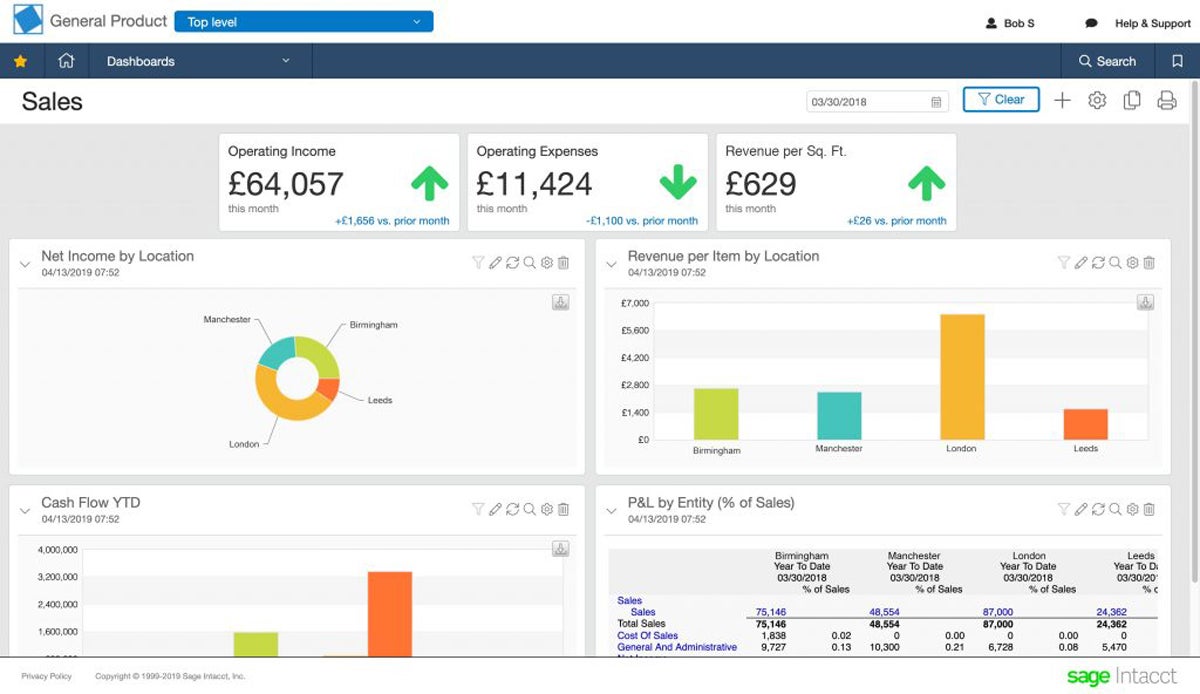
Why We Picked Sage Intacct
We picked Sage Intacct for its comprehensive suite of accounting functions tailored to small and medium-sized enterprises. Its customization options, from dashboards to reporting, allow businesses to manage and automate various financial processes in a way that best fits their needs.
Pros and Cons
| Pros | Cons |
|---|---|
| Highly customizable | Ease of use |
| Easy to implement user interface | Long wait time to download reports |
| Good scalability | Lack of pricing transparency |
Pricing
- Contact the company for a quote
Features
- AI-charged general ledger
- Dashboards and reporting
- Accounts payable and accounts receivable automation
- Advanced budgeting tools
- Automated bank reconciliation
- Reporting (Financial Statements, Cash Flow, GL)
Read our guide to the best artificial intelligence software to learn about the larger landscape of leading AI tools.
Oracle NetSuite
Best for Comprehensive Enterprise Resource Planning
Oracle Netsuite provides businesses with tools for enterprise resource planning (ERP), financial management, customer relationship management (CRM), and e-commerce. NetSuite Cloud Accounting software is a component of the larger NetSuite platform, which specifically focuses on financial management and accounting functions.

Features include a general ledger, accounts payable and accounts receivable, budgeting and forecasting, financial reporting and analytics, cash flow management, and revenue recognition. With its integrated modules for ERP, CRM, and e-commerce, NetSuite provides a unified platform for managing all aspects of a company’s finances, which can help businesses improve productivity, accuracy, and profitability. The company serves businesses across 21 industries and is capable of handling complex financial processes.
In October 2023, Oracle launched its generative AI tool, NetSuite Text Enhance, which uses company-specific data to help users generate or refine wording for business documents. This can be particularly beneficial for finance and accounting teams to expedite collections and close books faster, allowing them to focus on more strategic tasks.
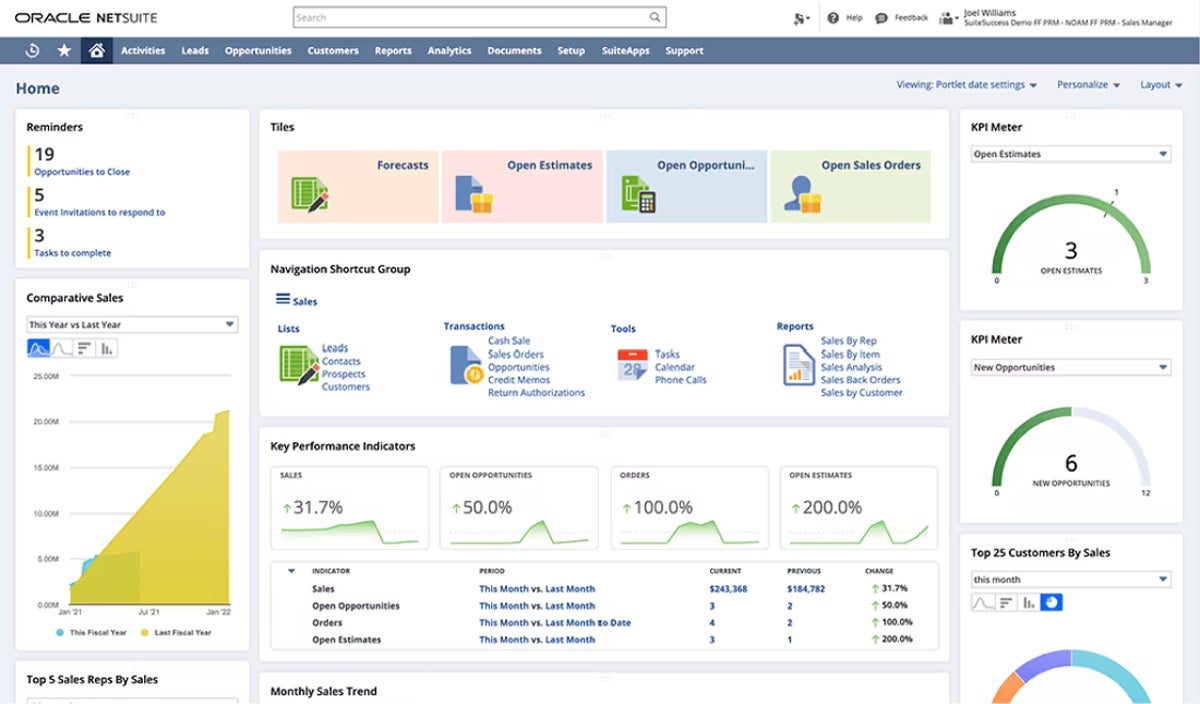
Why We Picked Oracle NetSuite
Oracle NetSuite stands out for its fully integrated ERP capabilities, offering financial management alongside CRM, e-commerce, and more. Its adaptability and depth of features make it a powerful solution for businesses seeking an all-in-one platform for more complex operations.
Pros and Cons
| Pros | Cons |
|---|---|
| Comprehensive, full-featured ERP | Lacks pricing transparency |
| Can be customized for your business needs | Steep learning curve |
| Easy to integrate with other systems | Occasional performance issues |
Pricing
- Contact the company for a custom quote
Features
- Accounts receivable and payable
- Account reconciliation and general ledger
- Cash and close management
- NetSuite Text Enhance generative AI
- Fixed assets, payment, and tax management
Intuit QuickBooks
Best for Small Business Accounting
With features like invoicing, expense tracking, financial reporting, and inventory management, Intuit QuickBooks is a popular accounting platform among small businesses and freelancers. It offers tools for managing finances, tracking expenses, creating invoices, and generating reports, while also streamlining accounting through automated bookkeeping, invoicing, time tracking, sales tax management, budgeting, bank reconciliation, and inventory tracking.
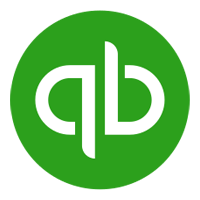
Intuit’s latest feature, Intuit Assist, is a generative AI-driven financial assistant that provides intelligent insights and personalized data-backed recommendations to help businesses make more informed financial decisions.
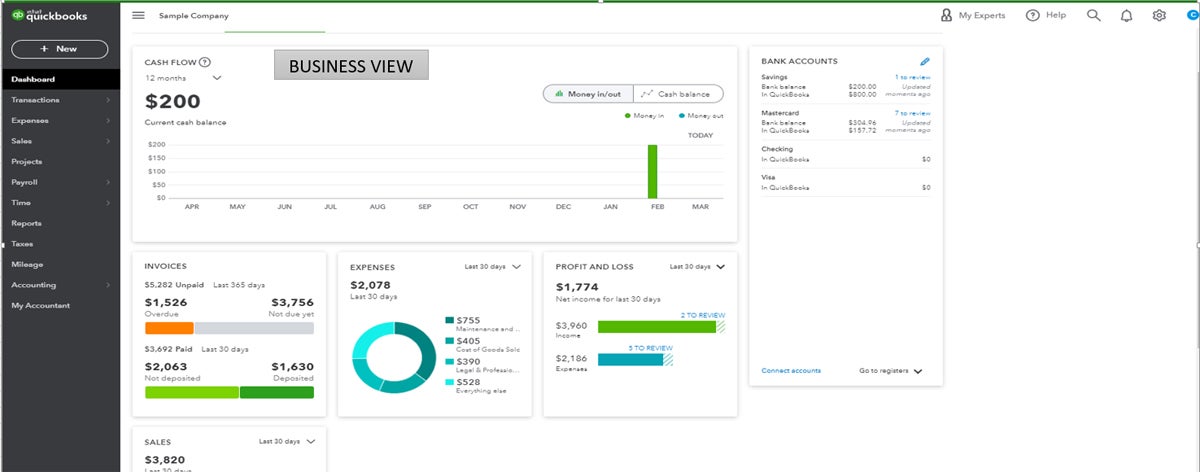
Why We Picked Intuit QuickBooks
We chose Intuit QuickBooks for its simplicity and range of features that cater to smaller businesses. Its user-friendly design and extensive tools for expense tracking, invoicing, and tax preparation make it an ideal choice for managing everyday accounting needs without too much hassle.
Pros and Cons
| Pros | Cons |
|---|---|
| Feature-rich and extensive integration option | Expensive |
| Easy set up and use | Support could be better |
| Supports multiple integrations | Lacks customization options |
Pricing
Intuit QuickBooks offers the following pricing plans:
- Free: 30-day trial
- Simple Start: $35 per month
- Essentials: $65 per month
- Plus: $99 per month
- Advanced: $235 per month
Features
- Track income, accept payments, provide invoicing and estimates, manage business bank accounts
- Track expenses and pay sales tax and contractors
- Prepare and file taxes
- Project profitability reports and tag transactions
Zoho Finance Plus
Best for Service-Based Businesses
Zoho Finance Plus combines the functionalities of various Zoho products—including Zoho Invoice, Zoho Books, Zoho Checkout, Zoho Expense, Zoho Inventory, and Zoho Billing—into a single platform. This integrated solution is tightly connected with Zoho CRM, providing a unified experience for managing contact interactions, sales and purchase orders, inventory management, expenses, subscriptions, accounting, online payments, and tax compliance. It also integrates with PayPal and Stripe.

Zoho Finance Plus is an ideal solution for a variety of businesses, especially service-based companies such as consulting firms, agencies, professional services providers, and freelancers. The platform caters to businesses that require financial management tools to facilitate operations, manage invoices, track expenses, handle subscriptions, and ensure tax compliance. We found Zoho’s ability to handle subscriptions and recurring payments to be particularly useful for subscription-based businesses.
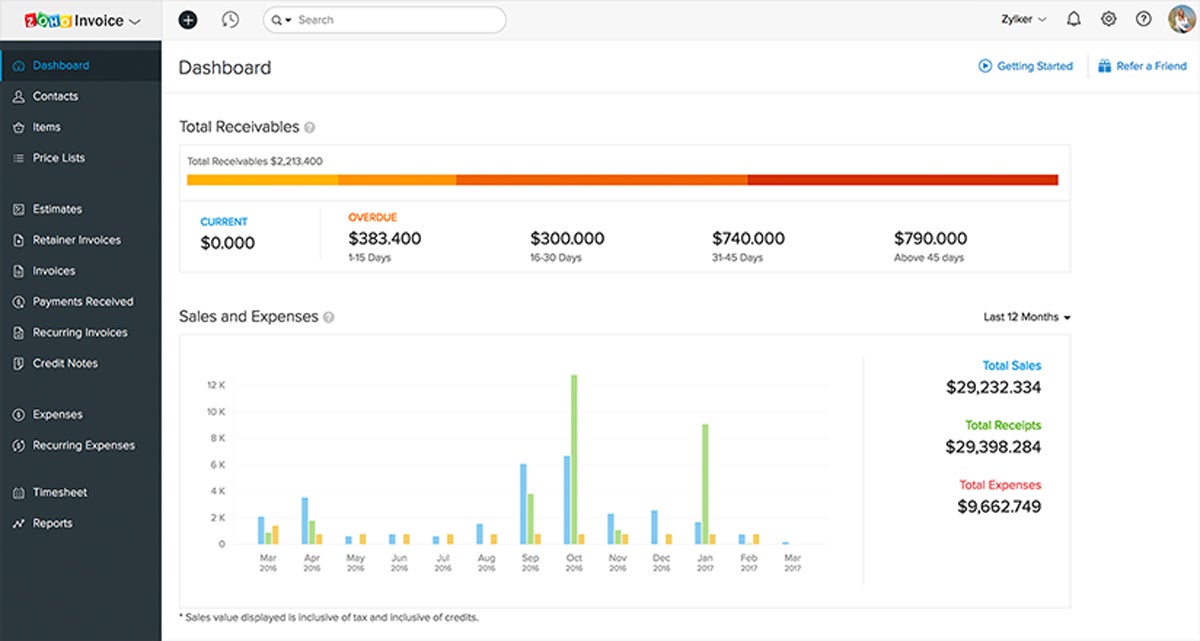
Why We Picked Zoho Finance Plus
Zoho Finance Plus earned its spot for its integration of various financial tools tailored to service-based businesses. Its capabilities in managing invoices, tracking expenses, and handling subscriptions offer a unified experience, and is especially beneficial for companies with recurring payment models.
Pros and Cons
| Pros | Cons |
|---|---|
| Tight integration with various Zoho apps | Zoho Books functionalities could be better |
| Feature-rich and modern interface | Limited customization |
| Automation tools help improve internal controls | Inventory management may be too simplistic for some businesses |
Pricing
- 14-day free trial
- $249 per organization, per month for 10 users
- $199 per organization, per month billed annually
Features
- Profit and loss (P&L) reports, balance sheets, tax reports, bills, expenses, general ledger, and vendor credits
- e-Commerce integrations
- One-time and recurring billing
- Subscription metrics including MRR (monthly recurring revenue), ARPU/A (average revenue per user/account), and LTV (lifetime value)
Domo
Best for Business Intelligence and Analytics
Domo is a cloud-based data platform designed to help businesses integrate, visualize, and use their financial data for better decision-making. It connects with over 200 finance apps, including popular tools like NetSuite, QuickBooks, Sage Intacct, Xero, and FreshBooks, allowing organizations to consolidate financial information from multiple sources into a single dashboard.

Domo’s machine learning features process large volumes of data to identify trends, detect anomalies, and assess risks in real-time. This information can help finance teams improve budgeting accuracy and optimize cash flow, as well as identify potential compliance issues or market shifts that could affect financial performance. Its flexible, user-friendly interface also allows users to customize their dashboards and reports, offering a clear, actionable view of key financial metrics.
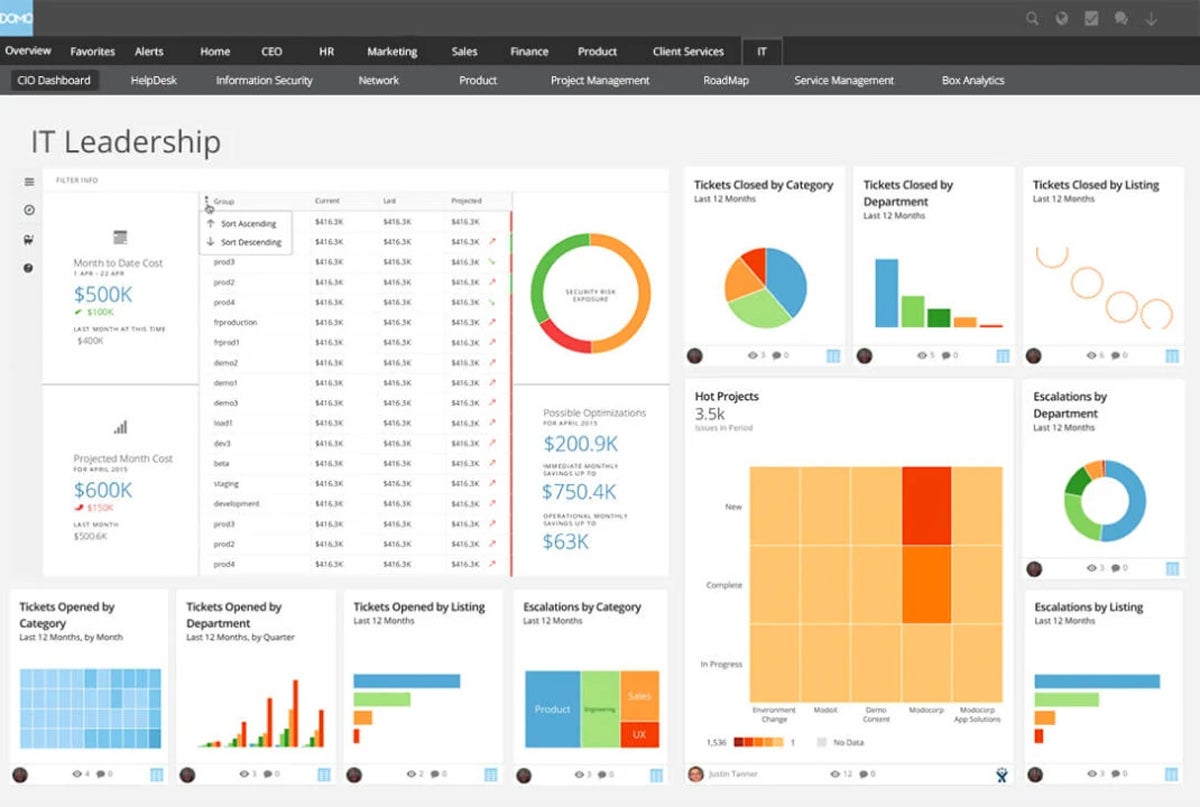
Why We Picked Domo
Domo made our list for its ability to provide useful, actionable real-time data and insights. Its user-friendly dashboard consolidates data from multiple sources, making it an excellent choice for finance professionals who need to continually analyze financial trends and optimize business performance.
Pros and Cons
| Pros | Cons |
|---|---|
| Generous free plan | Steep learning curve |
| Fast and responsive support | Costly for small businesses and startups |
| Insightful real-time data | Complex, opaque pricing structure |
Pricing
- Free: Up to 300 credits per month
- Standard: Contact Domo for a quote
- Enterprise: Custom pricing
- Business Critical: Custom pricing
Features
- Adrenaline DataFlows for analyzing large datasets
- Dashboard interactivity and customization
- Business app creation
- Business intelligence and analytics
- Data integration from any source
Booke.AI
Best for Bookkeeping Automation
Booke leverages AI to automate bookkeeping tasks, streamline data extraction from documents like invoices and bills, and improve client communication. It helps fix uncategorized transactions and coding errors and improves client communication. Booke.AI uses real-time optical character recognition (OCR) technology to extract and automatically record data from invoices, bills, and receipts, saving time and effort for internal teams.

Booke has a Robotic AI Bookkeeper tool that integrates with QuickBooks Online to review bank feeds and correctly categorize transactions. This uses AI models trained on historical business data to automate transaction coding to the correct general ledger accounts. This reduces the need for manual data entry and associated errors, making financial reporting more reliable and allowing businesses to focus on higher-value tasks.
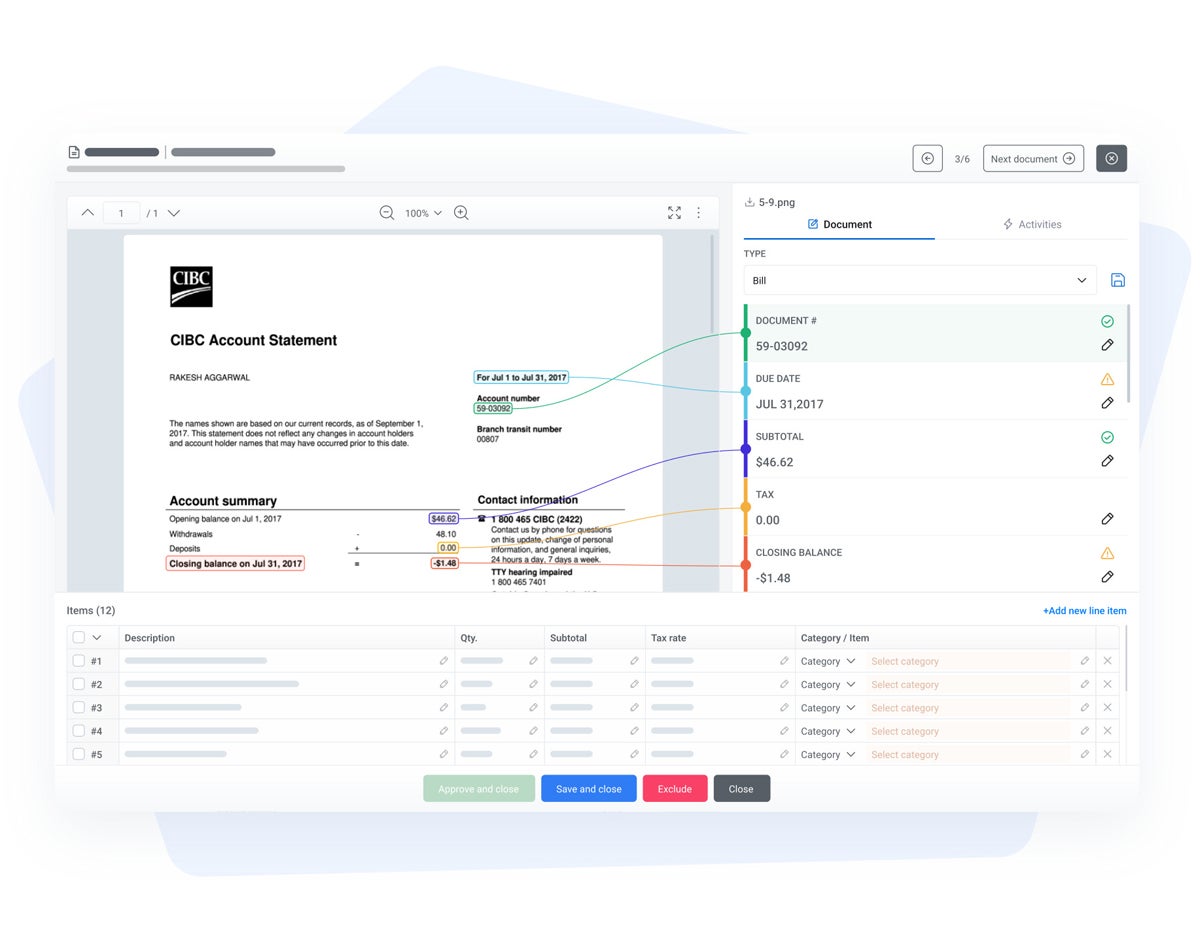
Why We Picked Booke.ai
Booke.AI was selected for its automated bookkeeping features, leveraging AI to categorize transactions and extract data from financial documents. It’s a useful and time-saving tool for companies looking to streamline bookkeeping tasks while reducing manual errors.
Pros and Cons
| Pros | Cons |
|---|---|
| Automated GPT-4 driven transaction categorization | Limited support channels |
| Time-saving OCR technology automates data capture | No free trial |
| Real-time error detection | Moderate leaving curve |
Pricing
- Data Entry Automation Hub: $20 per business, per month; $18 per business, per month billed annually
- Robotic AI Bookkeeper: $50 per business, per month; $45 per business, per month billed annually
Features
- OCR AI for automated invoices, bills, and receipts processing
- Handles daily, weekly, and monthly bookkeeping with GPT-driven robotic process automation (RPA)
- Browser extension for Xero and QBO lets you directly ask clients in QBO and perform bulk reconciliation in Xero
- Month-end close audit
- Reconciliation AI assistant
Stampli
Best for Accounts Payable Teams
Stampli is an accounts payable (AP) automation platform that helps businesses simplify their invoice processing and payment workflows. It uses AI-driven technology to automate data extraction, invoice approvals, and payment processing, helping organizations save time and eliminate manual data entry errors. Stampli also provides analytics and reporting tools to help businesses gain insights into their accounts payable processes. It centralizes AP-related communication, documentation, and workflows into one platform, making it easier for finance teams to manage and control their AP processes.

Stampli’s accounts payable AI, Billy the Bot, automates manual tasks such as coding invoices, detecting duplicates, matching discrepancies, and routing approvals based on company policies.
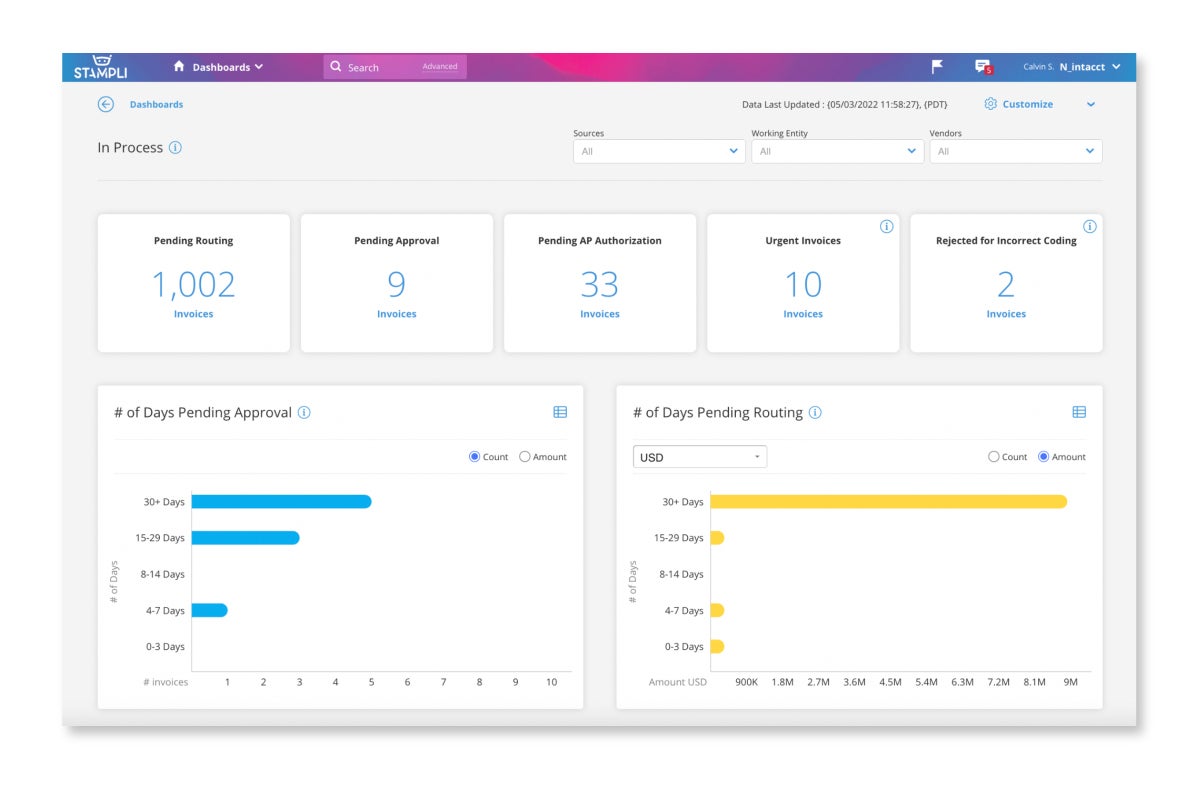
Why We Picked Stampli
Stampli is built specifically for automating accounts payable workflows, and uses AI to capture, code, and approve invoices efficiently. Its integration capabilities and collaboration-focused platform make it an effective tool for finance teams handling large volumes of invoices.
Pros and Cons
| Pros | Cons |
|---|---|
| Centralized collaboration | Lacks transparent pricing |
| AI-enhanced insights | Some users reported issues with the approval process |
| Highly rated customer support | Occasional issues with auto-population |
Pricing
- Contact the company for a personalized quote
Features
- Integrates with more than 70 ERP apps including Sage, SAP, and Oracle NetSuite
- Automates invoice capture, coding, and approvals
- Provides duplicate payment alerts to flag potential duplicate invoices
- Real-time reporting with dashboards for tracking invoice status
Nanonets
Best for Automated Data Capture
Flow by Nanonets is an end-to-end, AI-based AP automation platform designed to help finance teams manage supplier communication, process invoices, and optimize the accounts payable process. The software uses OCR technology to automatically read and capture invoice details from emailed or scanned invoices, eliminating the need for manual data entry and streamlining invoice processing. It offers finance teams a clear view of spending in real-time, allowing them to monitor expenses and cash flow more effectively. It also helps ensure compliance by enforcing approval workflows and controls, which track and manage invoice approvals according to pre-set company policies—reducing the chances of unauthorized payments.

Flow integrates with other accounting software, automatically syncing captured invoice data such as line items and general ledger codes in real-time. This ensures that financial records are up-to-date and accurate across systems, simplifying the financial reporting process. Nanonets also includes AI-powered anomaly detection for AP workflows, which can flag irregularities in invoice data.
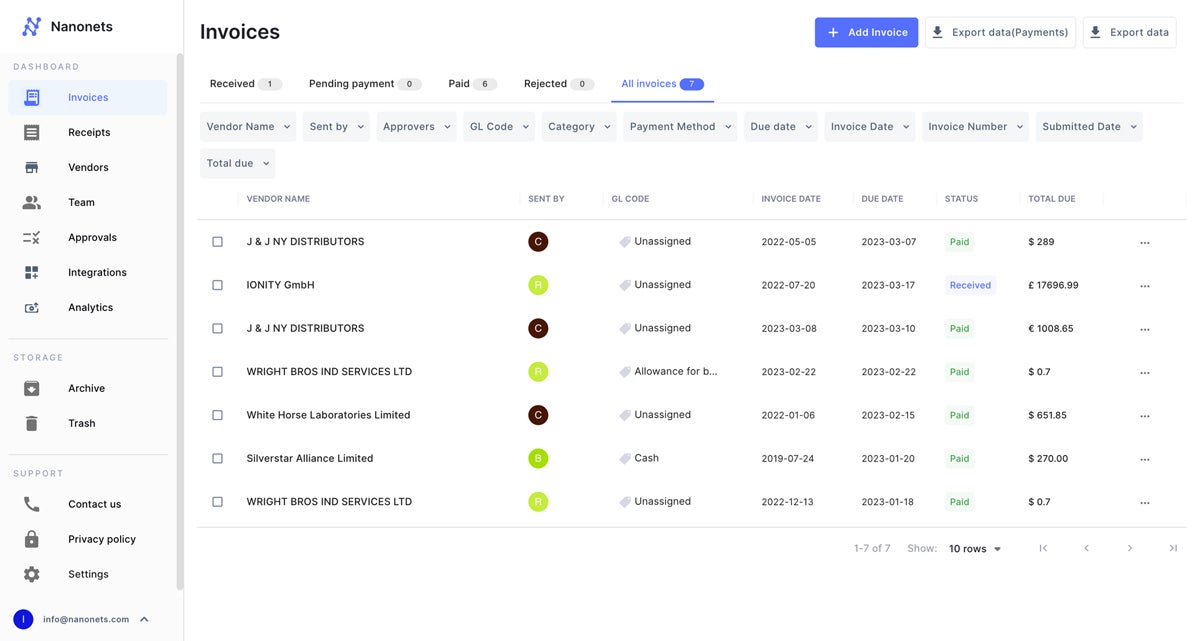
Why We Picked Nanonets
We picked Nanonets for its clever automated data capture and processing using OCR and AI. The software’s ability to integrate with accounting systems and support various document types makes it an excellent choice for businesses looking to incorporate innovative tools for streamlining data entry tasks.
Pros and Cons
| Pros | Cons |
|---|---|
| Support more than 300 document types | Steep initial learning curve |
| Set up custom accounts payable approval policies | Starter plan has limited functionalities |
| Intuitive application of AI and OCR technology | Pricing plans not transparent |
Pricing
- Starter: Pay-as-you-go; first 500 pages free, then $0.3 per page
- Pro: Contact sales for a custom quote
- Enterprise: Contact sales for a custom quote
Features
- Integrates with QuickBooks, Stripe, and Slack
- Automated data validation for extracted information
- Support on-premises deployment
- Collects historical data from SAP, Square, and Tableau
- Customizable document data extraction settings
Planful
Best for Financial Planning and Analysis
Planful is a cloud-based, AI-powered financial planning and analysis platform that helps organizations streamline their budgeting, forecasting, and reporting processes. It offers advanced features such as scenario planning, financial modeling, and real-time data integration to help businesses achieve financial agility. Planful is not just for financial planning and analysis: it’s increasingly used for cross-departmental collaboration on budgeting and scenario planning, too.

Its Planful Predict tool incorporates AI capabilities to enhance financial decision-making by automating tasks, reducing errors, and providing intelligent insights that can help businesses plan for the future and detect anomalies. Planful Predict is integrated within the Planful platform and includes two components: Predict, which signals for anomaly detection; and Predict, which supports financial forecasting. These tools are designed to improve data integrity and provide enterprises with data-based recommendations to improve their financial planning processes.
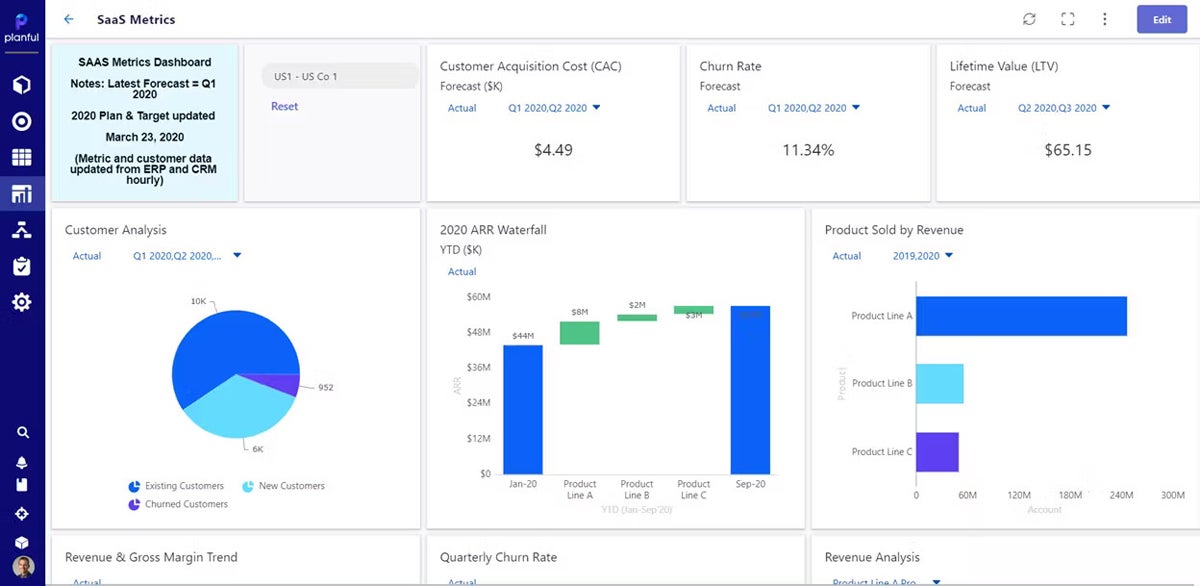
Why We Picked Planful
We chose Planful because we were impressed by its advanced budgeting, forecasting, and scenario planning features, which make it an ideal tool for finance leaders. Its AI-powered insights help businesses gain more accuracy in their financial planning, ensuring they stay agile in dynamic market conditions.
Pros and Cons
| Pros | Cons |
|---|---|
| Intuitive, user-friendly interface | Lacks pricing transparency |
| Customizable for unique use-cases that business requires | Some users report performance issues with larger data volumes |
| Strong collaboration features | Training resources could be improved |
Pricing
- Contact the company for a personalized quote
Features
- Budgeting and forecasting
- AI-powered insights
- Reporting and analytics
- Scenario analysis
Trullion
Best for Companies with Complex Financial Transactions
Trullion is an AI-powered finance platform that centralizes financial data and automates key processes like revenue recognition, audits, reporting, and lease accounting. The platform captures information from various sources, including billing systems, CRMs, contracts, and spreadsheets, to provide an up-to-date, centralized view of a company’s finances. This centralization helps with compliance by validating data, and it highlights inconsistencies in real-time, improving accuracy and reducing the need for manual checks.

Trillion is designed to automatically validate financial data against regulations such as ASC 606 and IFRS 15, reducing manual compliance checks. It also offers audit-readiness features that help businesses get their books in check when inspection time rolls around. The platform’s collaborative workspace offers a hub where auditors and accounting teams can work together, using automated workflows to streamline document management and financial statement validation.
For lease accounting, Trullion extracts structured and unstructured data from contracts, automating compliance tasks and updates. This integration allows businesses to maintain consistency in their financial operations and stay aligned with regulatory standards.
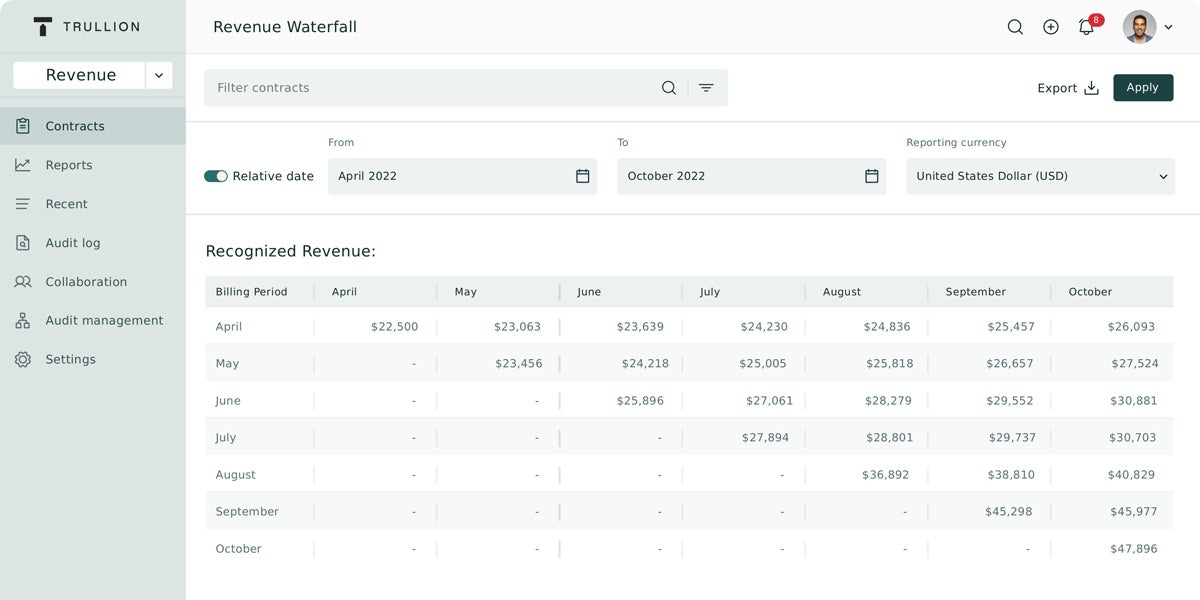
Why We Picked Trullion
We selected Trullion for its focus on simplifying complex financial processes like revenue recognition and lease accounting. Its ability to extract and automate data from various sources helps companies stay compliant and reduces the burden of manual data management.
Pros and Cons
| Pros | Cons |
|---|---|
| Encourages collaboration | Lacks pricing transparency |
| Useful automation features | May be overkill for small businesses |
| Reduces the risk of errors | Lease accounting functionality can be improved |
Pricing
- Contact the company for a personalized quote
Features
- Revenue recognition
- Audit capability
- Integrates with CRM, data warehouse, and ERP solutions.
- Lease accounting functionality
- Comprehensive data automation
Vena
Best for Real-Time Intelligent Reporting and Analysis
Like Planful, Vena is also a financial planning and analysis platform designed for budgeting, planning, forecasting, and consolidation. Vena stands out as an excellent choice for real-time intelligent reporting and data analysis. Its integration with Microsoft 365 allows users to leverage tools like Excel, Power BI, and PowerPoint for in-depth data analysis and robust reporting capabilities.

On Vena, you can easily create budgets, models, and scenarios, as well as collaborate with team members through shared workspaces and workflows. Vena also offers a centralized data repository and automated data collection, reducing manual errors and ensuring data accuracy.
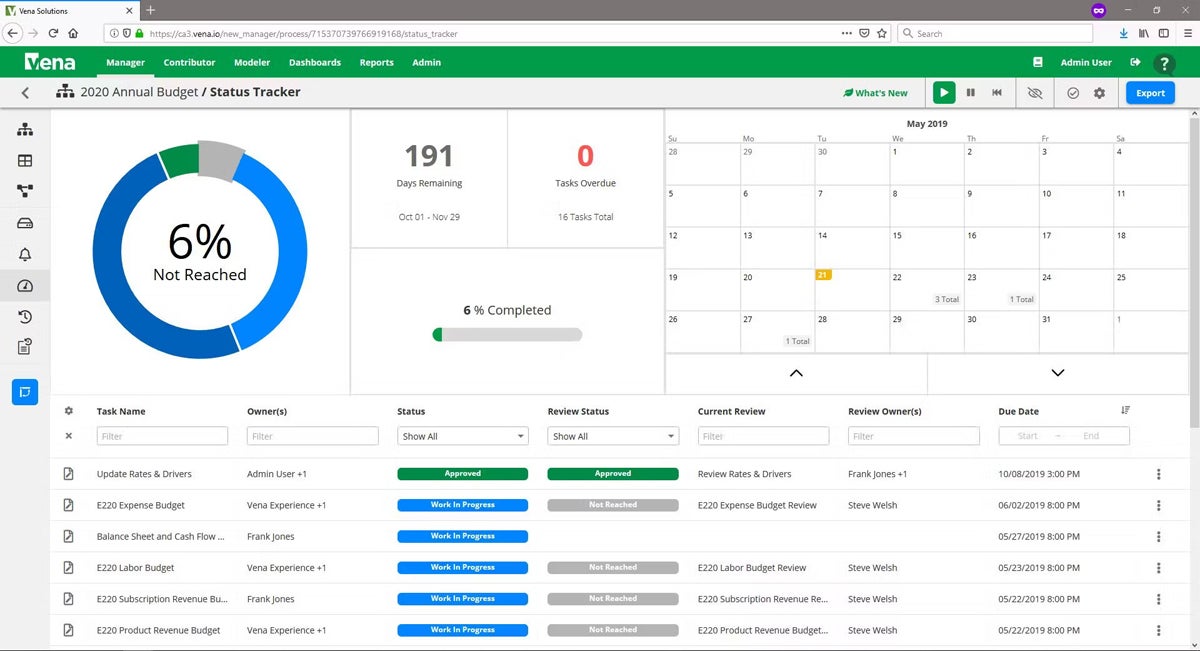
Why We Picked Vena
Vena integrates with Microsoft 365, providing a familiar interface for users to handle financial planning and analysis tasks. Its real-time reporting and data analysis capabilities, alongside its focus on collaboration, make it a strong contender for companies looking for detailed financial insights.
Pros and Cons
| Pros | Cons |
|---|---|
| Excel users will find the interface familiar | May be somewhat complex for those unfamiliar with Excel |
| Fast and responsive customer support | Limited online learning resources |
| Robust budgeting and forecasting tools | Businesses with complex requirements may find customizations limited |
Pricing
- Contact the company for a personalized quote
Features
- Reporting and analytics
- Full Microsoft Excel integration
- Central database includes relational/online transaction processing (OLTP) and in-memory online analytical processing (OLAP)
- Budgeting and forecasting
- CapEx planning
- Revenue, scenario, cash flow, and workforce planning
How to Choose the Best AI Finance Software for Your Business
Given the sensitive nature of financial data, it’s essential to employ a strict methodology when selecting an AI finance tool. Whether you want to automate accounting processes, predict financial trends, or enhance fraud detection, you must invest time and resources in choosing the right software for your business. Here’s a checklist to use for your selection:
- Determine your use case
- Evaluate the features
- Check compatibility with existing ERP, CRM, and other financial management tools
- Consider security measures
- Consider scalability—can the solution grow with your business?
- Consider your budget
As with any software, make sure you take the time to identify the problem you want to solve and the specific features you need before making a decision.
5 Key Features of AI Finance Software
AI finance software comes with features designed to streamline financial management and decision-making. These tools employ technologies like machine learning and optical character recognition (OCR) to automate routine tasks, reduce errors, and provide deeper insights into a company’s financial health.
Automated Data Capture and Processing
Many AI finance tools feature OCR and NLP technology that enables them to extract financial data from documents like invoices, receipts, and bank statements. They identify and categorize this information instantly, reducing organizations’ reliance on manual data entry, which is prone to errors. This can also improve efficiency by speeding up tasks like managing accounts payable and receivable.
Financial Planning and Forecasting
AI finance tools use machine learning to analyze historical data, predict trends, and generate forecasts and models for different future scenarios. This helps businesses make informed strategic decisions by helping them to project revenue and create budgets.
Automated Bookkeeping and Reconciliation
AI software that integrates with accounting systems and bank feeds helps keep records up-to-date by categorizing transactions and reconciling accounts in real-time. This enables businesses to maintain accurate financial records and spot any potential errors, which is particularly important for ensuring compliance during financial closing.
Real-Time Financial Reporting and Analysis
Many finance tools offer AI-powered dashboards that compile key financial metrics and provide an up-to-date view of a company’s financial status. In addition to analyzing trends regarding expenses, cash flow, and revenue, finance software can detect anomalies that might indicate fraud or accounting discrepancies. This enables finance teams to better respond to market changes and performance shifts.
Fraud Detection and Compliance Management
AI finance tools monitor transactions for unusual activity and flag suspected cases of fraud in real-time. They can also keep track of regulatory changes, allowing companies to adapt their practices accordingly and stay in the clear.
How We Evaluated the Best AI Finance Software
To evaluate these AI finance tools, we looked at each tool’s standard and unique features while focusing on the following criteria. Each criterion is weighted based on its importance to the typical business user.
Feature Set | 35 percent
Feature set carries the highest weight in our evaluation as it directly impacts the capabilities and functionality of the software. We looked at factors such as the extent of AI use in solutions, customization options, integration with other tools, and advanced security features. We also determined whether solutions offered more advanced features for businesses with complex datasets and workflows.
Cost | 25 percent
The cost of each tool was evaluated based on factors such as the overall affordability of the software, transparency of pricing, and the availability of a free trial.
Ease of Use | 25 percent
Ease of use was evaluated based on each tool’s user interface, navigation, and overall user experience. Factors such as accessibility and intuitiveness were considered in determining the ease of use of each tool.
Customer Support | 15 percent
Support was evaluated based on the availability of customer support channels, response times, and overall customer satisfaction ratings. We considered factors such as live chat support, phone support, and comprehensive knowledge base resources to determine the level of support provided by each AI finance software vendor.
Frequently Asked Questions (FAQs)
The best AI finance software will vary depending on your specific business needs and goals. It is important to research each option thoroughly and consider factors such as pricing, user reviews, and features to determine the best fit for your business.
Provided they are chosen and implemented properly, AI finance tools can offer a number of business benefits, including:
• Improved accuracy in financial reporting and forecasting
• Increased efficiency in data processing and analysis
• Reduced risk of errors or fraud
• Better insights into financial trends and opportunities
• Automated tasks such as invoicing, bill payments, and budgeting
Yes, AI can help identify and mitigate financial risks by analyzing large datasets, spotting anomalies, and providing real-time insights into financial health. This can help businesses to proactively manage potential risks related to credit, market fluctuations, fraud, and compliance to shifting regulations.
There are a number of software solutions that are designed to meet the needs of small businesses. These tools often include features like automated bookkeeping, invoicing, and expense tracking, making them useful for small business owners who want to streamline their finances. That said, smaller businesses will likely be limited by lower budgets, meaning they may not be able to make use of more sophisticated or feature-rich AI solutions—if they need them to begin with.
The challenges of AI in finance are similar to those facing other industries, including—but not limited to—data privacy concerns, regulatory compliance, and the need for high-quality data to train algorithms. Likewise, some businesses may also struggle to integrate AI tools into existing systems or adapt to new technologies.
Bottom Line: AI Finance Tools Can Streamline Business Accounting
With the support of AI-charged software, financial management has evolved from traditional repetitive tasks and manual data entry methods into automated processes that provide real-time insights and help businesses make more educated decisions with their money.
AI finance tools not only make your finance teams more agile, but also reduce errors and allow teams to focus on more strategic tasks. This saves you money and helps your teams be more productive. The benefits of AI finance tools are compelling, and—when implemented successfully—the return on investment can be substantial in the long run.
For a full portrait of the AI vendors serving a wide array of business needs, read our guide to the top AI companies.
